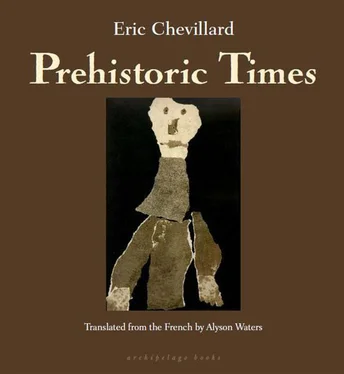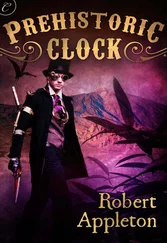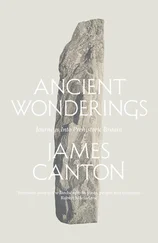Ah, but my leg, my voice. It’s work for a good walker, but my leg; and a smooth talker, but my voice. I limp slightly with the left leg, after a fall, I’ll have to tell you about that; and my voice does not come out of its hole voluntarily, it is afraid of the light, I have to moan and groan for a long time to find it, pull it out by hand. My voice is reluctant to leave my mouth, it sticks there like rice pudding, tickles my taste buds, offers to replace a tooth, I part my lips, here it comes at last, I’m speaking, you can hear me if you lean in, it’s a husky voice, very deep, very soft, it couldn’t blow out a candle but it pushes gravel along, a voice to say no, to say shhh, to say a faint farewell like at the end of a long enumeration, its register exhausted, when the words begin to go missing, but that’s not the case, I’d have a thousand things to say, truths to deal out, secrets to divulge if my voice would only come out normally, I have words to amuse, instruct, move, all the words at my disposal, to serve the mind and penetrate the shadows of enigmas, this voice in the brambles of my pharynx brought my answer to the sphinx: more poetry, I know, I heard, I’m not bragging, it just slipped out, poetic verses are naught but the quirks of my conversation. Sometimes my voice cracks on a rare rhyme and my stutter stumbles even more, I don’t really stutter, rather I quaver like a baby goat. Alas my new duties demand, if not the exceptional talents of an orator with his carafe, at least a particular aptitude for public speaking. I have it not. This leads me to wonder if I am really cut out for this job, and so, because I was wondering about the same thing at the start of this exposition, you can refer back to it, for I do manage despite everything to land on my feet. As far as I can remember, I have never actually fallen flat on my face, except that once, my leg.
On the other hand, I have no choice. If I give up this work, how will I earn my bread, my fresh daily bread, and metonymically, the bread that also connotes the jam and the knife to cut it, the drawer in which to store the knife, and the buffet in which to slide the drawer, and the kitchen in which to place this buffet, and the dwelling place that, in addition to this kitchen, must have at least a bedroom with a bathroom, a wardrobe for my wardrobes, winter and summer? There is as much plaster and cotton as there is flour in the baking of the daily bread, it’s a serious trade, baking is; at this point it could even be termed pastry rather than bread — whence it follows that unchained logic is a superior form of lyricism, a blaze of vertebrae, a wild and deductive madness that organizes everything in its path and never lets up until it has reached the end of its implacable proof: is it not obvious by now that one’s daily bread is a veritable party cake, the sort of mille-feuilles or outrageously expensive pièce montée that my disability pension would certainly never allow me to offer myself, and certainly not on a daily basis, my meager disability pension, do I even have the right to the most meager of meager disability pensions? As for my taking up a new career, you’ve got to be joking; it’s out of the question. My only knowledge is of the archaeological sort, my experiences archaeological, my expertise archaeological, and here I am thinking of the remotest eras: I am not even really up on Antiquity, so when it comes to anything after Jesus Christ, I am truly worthless. After Christ, I no longer exist, why deny it? The only thing that interests me is prehistoric times, I can manage there, deep within prehistoric times I hold my head high, I find my landmarks, my ease, for once I feel buoyed by a time period, I am one with it, I understand it better than anyone else, I mold myself to its battles, I love it, I revel in it. If it weren’t in direct contradiction with its very principle, I would give it my name.
THE END of prehistoric times was precipitated by the advent of writing. More precisely, the advent of writing is considered to be what marks the end of prehistoric times; in brief, prehistory comes to an end when the story begins. Present on Earth for three million years, and no doubt tired of being himself (understandably so), immutable despite the morphological transformations that little by little distinguish him from the monkey but do not for all that cause him to resemble the tiger, man became that character in fiction whose extraordinary adventures will continue to unfold from book to book until sooner or later writing disappears because these adventures will wind up becoming tiresome as well: in truth their rapid and uninterrupted succession depicts the most perfect figure of immobility known since the great glaciations of the Quaternary. This modest, off-the-cuff lecture does not have as its sole aim the clarification of the meaning of my trade, nor is it intended as proof of my credentials in the matter; its main purpose is rather the additional reprieve it allows me by justifying my reticence to get down to work, on the one hand, and, on the other, by making me temporarily unavailable by the very fact that it keeps me so very busy and does not leave me the leisure to carry out my duties. Nonetheless, this additional reprieve will be short — Professor Glatt was very clear on this, I have delayed long enough: the reopening of the site can no longer be put off.
Closed due to death . The day after Boborikine died the sign was hung on the gate, what am I saying, on the heavy gate — because the epithet was melted, forged, welded, coated with minium and painted green, and so were the bars, the thick bars that seal the sole entrance to the cave. Visitors are said to have banged their heads against them; perhaps they thought the death notice referred to the creators of the cave paintings inside, whom they had believed already dead for quite some time, years and years; so you see it is best not to tread on the grave diggers’ turf and leave them to bury the mortals themselves when the time comes. And the visitors will have gone back home meditating on this lesson; perhaps along the way they mentioned the analogous, not unusual case of the writer who, famous in his youth, chooses nevertheless to withdraw from the literary scene; we lose track of him but his previous work is still impressive and in print, others are inspired by him, he is quoted, annotated, no one knows how he died, or where, or precisely when. Legends abound, perhaps it was suicide, or an airplane crash in the mountains, the Mexican border, until the day the octogenarian who has calmly lived out his life catches cold on his doorstep and finally dies for the last time, in his bed.
Boborikine’s death has gone on long enough. It is now time to open the cave to the public. Not that, mind you, Boborikine’s death is no longer a sad reality, quite the contrary, it has been confirmed. Boborikine died three months ago and he has not stopped being dead ever since; his death continues as if it will never belong to the past, it is perpetuated in the present, daily, ceaselessly, impossible to see how it will ever end. It is only as an active cause governing the cave’s closing that Boborikine’s death is considered finished, past, of no consequence, with no effect, no tomorrow. In this regard mourning is finito . We can reopen.
Professor Glatt gave me the clef that opens the gate, for I am not a man to write clé when it is possible to write clef , even if in so doing I compel the translators of my tale to slow down — and I trust they see no malevolence where none intended; I would gladly let them have a full page to express this slight difference in leisurely, creative circumambages that will even further delay my taking up my post* and so I shall wait until they have surmounted the difficulty, there’s no bad faith on my part this time, it’s simply a matter of a force majeure, which, by definition, cannot be imputed to me, pace Professor Glatt; my conscience is clear, I didn’t invent writing and when given the choice between two spellings, I always, because I am an honest sort, opt for the one that serves my thought or intention better — a clef is heavy in the hand, it is dotted with rust, worn on one’s belt, unlike a clé , what I understand in any case by clé : its clink-clink like small change deep within your pocket. Likewise, the ornithologist who is also an etymologist will write pic-vert , whereas a bird-watcher who doesn’t give a hoot will write pivert , the way it’s pronounced. I had nothing to do with it.
Читать дальше












